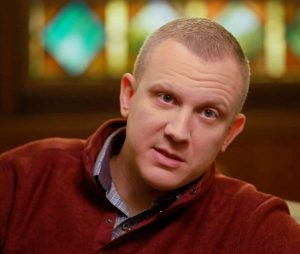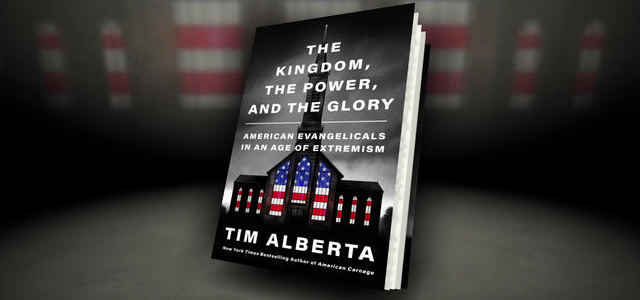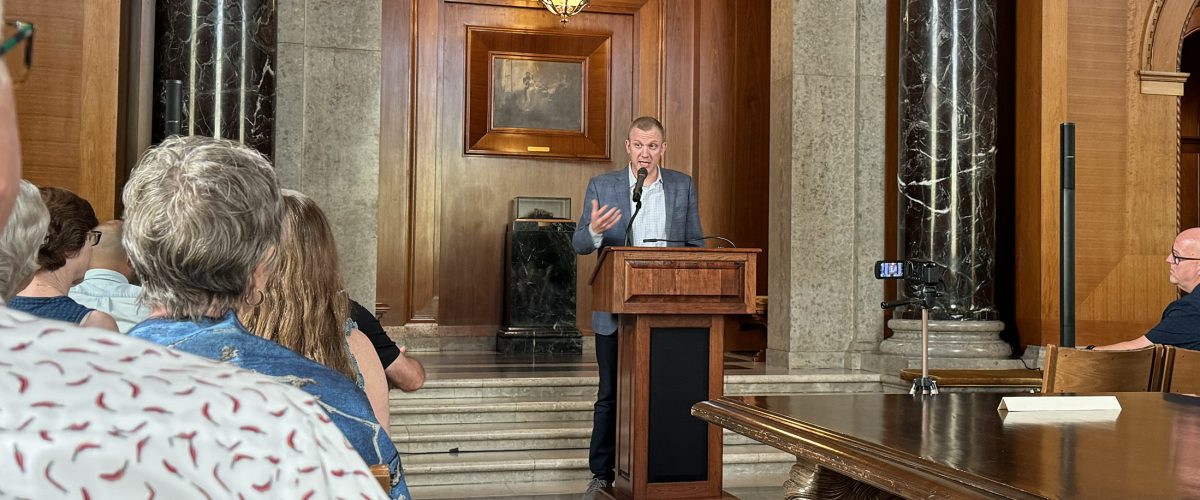Donald Trump and JD Vance have “willfully antagonized the pro-life movement” out of fear of losing suburban female voters in key states, political reporter and bestselling author Tim Alberta said at Baylor University Sept. 4.
Albert, author of The Kingdom, the Power, and the Glory: American Evangelicals in an Age of Extremism, spoke to a small group of faculty, staff and media at a luncheon on Baylor’s campus and then gave a longer lecture for about 200 faculty, students and guests in the afternoon.
The luncheon conversation was structured as a dialogue between Alberta and Baylor professor Greg Garrett, who also is a BNG columnist. During a question-and-answer time, one participant asked Alberta what he thought was going on with both Trump and Vance recently appearing to soften their anti-abortion views. Trump said last week he thinks Florida’s ban on abortions after six weeks of pregnancy is too restrictive. He also said if elected to office he would be “great for women and reproductive rights.”

Tim Alberta on “CBS Sunday Morning.” (Video screen cap)
Within days, Trump walked back those statements, facing a backlash from the pro-life movement, which was crucial to his 2016 election. So crucial, Alberta said, that single-issue abortion voters in Michigan, Wisconsin and Pennsylvania gave Trump the White House in 2016.
Abortion politics
“Donald Trump wins in 2016 by a combined 77,744 votes spread across Michigan, Wisconsin, Pennsylvania,” he explained. “And in those states, if you look at the exit polling, if you look at some of the after-election analytics that are done, there’s no question that it’s single issue pro-life voters who held their noses and voted for him in part because (Mike) Pence was on the ticket, in part because there was a Supreme Court seat hanging in (the) balance and with a promise of at least one or two more appointments to come.”
Trump campaigned in 2016 on “putting pro-life justices on the bench,” Alberta said, adding that for 50 years many evangelical anti-abortion voters had been told they weren’t just voting for a president, “you’re voting for Supreme Court appointees, therefore you’re voting for abortion policy in America.”
Yet evangelicals and Republicans overplayed their hand in overturning Roe and created a backlash that’s working against them this election year, he said later.
“This is our first post-Roe v. Wade presidential election where the issue is now effectively decentralized.”
“This is our first post-Roe v. Wade presidential election where the issue is now effectively decentralized, and to the degree that it is driving voter sentiment at all, you have Donald Trump and JD Vance sort of going out of their way because they’re so consumed with trying to win the affluent suburban women outside of Detroit and Milwaukee and Phoenix and Atlanta and Vegas and elsewhere. They’re so consumed with the focus groups and the polling showing that this is the issue that could drive these women away from them that they have willfully antagonized the pro-life movement.”
This year’s election, like the 2016 election, will be decided “at the margins,” Alberta predicted. “And if even 1% of those self-identified single-issue pro-life voters in Michigan, in Wisconsin, if they stay home, then he can’t win. So that is a serious problem.”
In response to Trump’s waffling on abortion, Alberta added, some of the figureheads in the pro-life world “have contorted themselves into pretzels … to sort of say, ‘Well, we still know. We watched what he did during his first term. We still know that a second Trump administration would be much better on the life issue than Harris. And we also know that he believes in X, Y, and Z, and therefore we are all still for him.’”
Ordered priorities
Later, after the lecture in Baylor’s historic Armstrong Browning Library, Alberta was asked again about abortion and how Christians who believe opposing it is a moral issue should respond. Shouldn’t they still exercise their right to vote?
Alberta said yes, Christians of moral conviction absolutely should get out and vote.
“They got in bed with politicians who saw them as easy marks and abused them and manipulated them and took advantage of them.”
He quoted former Vice President Pence, whom he covered for many years prior to his term in Washington, who routinely told audiences he is “a Christian, a conservative and a Republican, in that order.”
Pence has been able to maintain that order in his political life, but most politicians can’t, Alberta said. “A lot of people can’t do it.”
Those who are most genuinely drawn to the anti-abortion movement do so out of moral and ethical conviction, not political conviction, he noted. “The vast majority of people who have sort of affiliated with and identified with the pro-life cause, they have just sort of lazily pushed their eggs in the political basket.”
This fed into the larger point of his afternoon lecture — that sounded as much like a three-point sermon as a lecture — as he detailed the accounts in the Gospels where Jesus resisted the temptation to claim worldly power and where the Apostle Peter learned the hard way that Jesus doesn’t want to take over government.
Those who oppose access to abortion on moral and ethical grounds as Christians do not need to soil themselves with a political agenda, he said. “For 50 years, people put their eggs in that political basket. They treated it like a political issue. They got in bed with politicians who saw them as easy marks and abused them and manipulated them and took advantage of them. Finally, the bank shot lined up just right. Roe v. Wade fell, and what was the result? More abortion in America.”
Seeking an end to abortion through political means not only backfired but made the cause even harder, he declared. “The reality is that there are limitations, real limitations, on what politics can do to advance the kingdom of God. And it’s not just that statistically the number of abortions increased, it’s that when you look at all of the public polling, all of the available data on this question for the last three or four years, if you look at it on the continuum, dating back decades, public sentiment has turned so sharply pro-choice, not just among Democrats and independents, but among Republicans.”
That’s why Trump felt comfortable in ridding the Republican Party platform of its pro-life language, he added. “It’s why JD Vance feels comfortable going along for the ride. You can win elections but lose something greater.”

Christian nationalism
After the lecture, another person asked Alberta what he thinks of the term “Christian nationalism.”
One of the problems, he responded, is that “if you ask 10 different people here, you might need 10 different definitions of what it is. I’m really hesitant to use the label ‘Christian nationalist’ unless it’s for people who are sort of self-described nationalists. Because I think for lots and lots of people who love God and love America, they hear it as an insult, as a pejorative, and they sort of think, ‘Well, maybe I’m a Christian nationalist. What’s so wrong with that?’”
True Christian nationalism, he said, “should really be understood as the alliance between bad history and bad theology.”
True Christian nationalism, he said, “should really be understood as the alliance between bad history and bad theology.”
The two always work together, he said, citing current efforts in Texas and Louisiana to “rewrite” history books under the influence “of people like David Barton,” a self-styled historian who teaches America was founded as a “Christian nation.”
“The goal (of) people like Barton is to systematically convince the churchgoing masses that actually your history teachers lied to you. That we were founded to be explicitly a Christian nation, that the founders were doing one big elaborate wink and nod when they wrote the First Amendment, that in fact theocracy is pretty consistent with our founding ideals and that we were in many ways designed to be a nation ruled by European Christian men.”
That’s “all garbage,” Alberta declared. “Any historians here could help me pick this apart in 90 seconds or less. But it’s really compelling, right?
“If you’ve ever, I’ve seen David Barton perform — and I do use that word intentionally —and if you watch one of his little slideshows he puts together with all of his cherry-picked quotes and misleading transitions that he makes, you’ll come up and be like, ‘Oh wow, they didn’t teach me this. My history teacher did lie to me. … I didn’t know this.’ Right? And once you start thinking differently about what this nation is, once you start to convince yourself that this nation is the new Israel, … well, then you start to create a justification to manipulate and distort Scripture itself. So even though Peter writes that God does not show favoritism among nations, well except for us.”
He declared there’s “a pretty straight line from distorting American history” and “distorting the gospel and creating in the gospel story a justification for conflating the kingdom of God with the kingdom of earth.”
COVID-19
As for the crisis in faith and politics as seen by white evangelicals, Alberta said he believes future historians will pinpoint COVID-19 as the biggest inflection point.
“If you are anywhere within 10 years of my age (38) on either side, if you grew up in a very serious Christian household, you probably became at a certain point desensitized to some of the rhetoric around the imminent Armageddon, this apocalyptic clash between the good God in (the) Bible, the Christians, and those wicked woke secular humanists out in culture who want to come for you and shut down your church,” he said. “After a while, you start to roll your eyes.”
From Jerry Falwell Sr. forward, white evangelicals have been warned that big government and woke liberals were “indoctrinating our kids. They’re coming for our churches. This is the most important election of our lifetimes.”
It was so severe, he joked, that some said, “If we don’t beat Jimmy Carter, we will never recover — Christianity will be dead in America if Jimmy Carter, the Sunday school teacher, Southern Baptist” isn’t driven from the White House.
“COVID-19 was what sort of poured kerosene on a pretty small fire.”
He explained: “If you were one of these church kids who grew up marinating in that message, that end-times message of they’re coming for us, well then you understand why in the spring of 2020, a bunch of these pastors and activists all started standing up and saying, ‘Well, here we have it.’”
Government health restrictions related to preventing the spread of COVID were “the fulfillment of prophecy, and I don’t think that this crisis moment that we’re describing here would be the same without that. … COVID-19 was what sort of poured kerosene on a pretty small fire. Because what it did was it radicalized a lot of people in both directions. … I can’t sit down with a pastor in any part of the country without the conversation going to COVID-19 within the first 5 or 10 minutes because they’re still healing.”
How a person responded to the pandemic — wearing masks, avoiding large groups, getting vaccinated — became a new litmus test for white evangelicals, he explained.
Sales not management
In the afternoon lecture, Alberta concluded by quoting a line he heard his pastor-father say repeatedly: “We are in sales, not management. Your job is to sell Jesus. And guess what? It’s a pretty easy sales job. He kind of sells himself.”
Following this advice means Christians “let God handle these big, thorny scary problems that you feel crushing down on yourself and worry about how you can draw closer to him and how these challenges, these threats are actually opportunities.”
God is not driven by the fear that motivates so many white evangelicals, the author said.
“Can we resist this temptation to subjugate our neighbors and dominate the culture? How will we respond to the threats real and perceived that come for us, for our church, for our faith, for our way of life? This is a season of testing for all of us, but fear not. If you are a Christian, you already have the answers.”
Alberta’s appearance at Baylor was sponsored by the J.M. Dawson Institute of Church State Studies.
Related articles:
Politics, faith and mission: A talk with Tim Alberta on his book and faith journey | Opinion by Greg Garrett
Don’t believe Trump’s claims he will be ‘great for women and their reproductive rights’ | Analysis by Rodney Kennedy


